There’s Something Odd About Voting in a Church
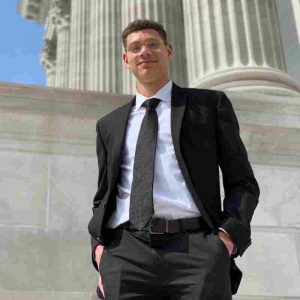 This well-crafted op-ed appeared in the Sunday, November 27 edition of the St. Louis Post-Dispatch. It was written by Gray Fuller, a senior at John Burroughs School. The link is here.
This well-crafted op-ed appeared in the Sunday, November 27 edition of the St. Louis Post-Dispatch. It was written by Gray Fuller, a senior at John Burroughs School. The link is here.
 This well-crafted op-ed appeared in the Sunday, November 27 edition of the St. Louis Post-Dispatch. It was written by Gray Fuller, a senior at John Burroughs School. The link is here.
This well-crafted op-ed appeared in the Sunday, November 27 edition of the St. Louis Post-Dispatch. It was written by Gray Fuller, a senior at John Burroughs School. The link is here.
Church/state lawyer Andrew Seidel has a new book out, “American Crusade: How The Supreme Court is Weaponizing Religious Freedom”. Mr. Se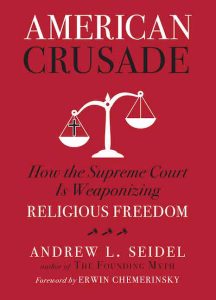 idel explains in detail, with deep understanding and numerous examples, the dangerous perversion of the First Amendment that SCOTUS has promulgated. The thesis of the book is identical to the AU viewpoint, and will give you all the talking points you will need for your next cocktail party arguments.
idel explains in detail, with deep understanding and numerous examples, the dangerous perversion of the First Amendment that SCOTUS has promulgated. The thesis of the book is identical to the AU viewpoint, and will give you all the talking points you will need for your next cocktail party arguments.
I learned about the book because of the “Opening Arguments” podcast, an enthusiasm that I recently learned that I share with AU President Rachel Laser. The 11/1 episode that includes an interview with Mr. Seidel is linked here.
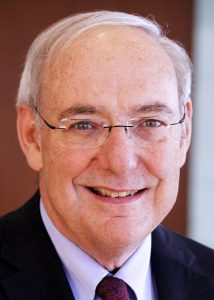 The picnic was at Deer Creek Park (also known as Rocket Park) – North Pavilion, in Maplewood. We provided sandwiches, beverages, and dessert to a good crowd.
The picnic was at Deer Creek Park (also known as Rocket Park) – North Pavilion, in Maplewood. We provided sandwiches, beverages, and dessert to a good crowd.
Mr. Wolff was on the faculty at St. Louis University for 23 years before he was appointed to the Missouri Supreme Court, where he served from 1998 to 2011, and Chief Justice from 2005 to 2007. After his stint on the Supreme Court, he returned to SLU and was Dean of the Law School until 2017., and still has an Emeritus appointment. He has spoken to us before, and is always an engaging speaker.
 E. J. Dionne, Jr., Washington Post columnist and Professor of Government at Georgetown University, published an inciteful commentary on the Supreme Court decision in Kennedy v. Bremerton School District. Click here to link to the column, which appeared on August 3.
E. J. Dionne, Jr., Washington Post columnist and Professor of Government at Georgetown University, published an inciteful commentary on the Supreme Court decision in Kennedy v. Bremerton School District. Click here to link to the column, which appeared on August 3.
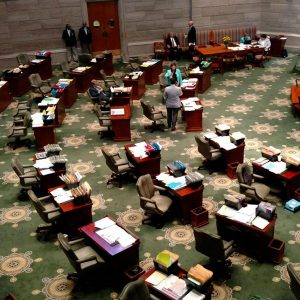 (Sponsor of this bill is [D]Senator Karla May)
(Sponsor of this bill is [D]Senator Karla May)
Dear Senator:
As an ordained Baptist Minister and an Attorney, I share my thoughts with the Education Committee in opposition to Senate Bill 323. Even under the guise of being an “elective” course this legislation presents a variety of problems. To start with the bill is clearly drafted from a “Christian” perspective. It does not originate from a perspective of “religious neutrality” and therefore fails to be accommodating of “diverse religious views, traditions, and perspectives of students” in public schools. This being the language provided in the bill. Furthermore, it appears the basis for the legislation is an ill-conceived and erroneous concept that American culture somehow flows from a Christian evangelical or fundamentalist biblical worldview.
The bill erroneously refers to the “Hebrew Scriptures” as the “Old Testament of the Bible.” A clear and exclusively “Christian” designation. The Hebrew Scriptures, i.e., Jewish Bible, has a name. It is not the “Old Testament”, only we Christians use that term. The Hebrew Scriptures are the Tanakh. This Christian labeling of these Scriptures provides the clear indication that the “elective” course is intended as one presented from a Christian, not a neutral perspective.
One must reasonably question how many social studies teachers (if any) possess the requisite education and training in Hebrew or Christian Scriptures to lead a class intended to instruct in “biblical content, characters, poetry, and narratives.” The couching of these concepts under the claim of being “prerequisites to understanding contemporary society and culture”, begs the question why such a course would only be an elective? It is difficult to see how that writings from 2,000 to 4,000 or more years ago from ancient middle eastern cultures provide a basis for understanding 21st Century American “literature, art, music, mores, oratory and public policy.”
As Biblical scholars understand, any attempt to study the content, characters, poetry, and narratives of the Christian Bible or the Tanakh, absent an understanding of the religious underpinnings of these aspects, is simply not good scholarship and instruction, and hardly qualifies as worth the time expended in such an effort.
All the suggested purposes for this legislation have been addressed throughout our nation’s history by the simple means of Jewish and Christian congregations through worship and the study of their respective scriptures. This continues to be the case, as week after week, synagogues, temples, and churches provide worship and learning opportunities for any who are interested. The legislation is quite simply an attempt under the subterfuge of authorizing an “elective” high school social studies course to move Christian faith, doctrine and teachings from the local church building into the public school. It is unnecessary, as there is virtually not a community in our state where interested high school students can not find a local Christian congregation to receive instruction in the Bible. Furthermore, the multitude of Internet sites from which students may research all aspects of Biblical teachings goes beyond the thousands.
For many of us who are people of faith, reducing the Christian Bible to simply a social studies class is demeaning not only to the Bible, but also to observant Christians.
I suggest there are much more important educational issues before the Missouri General Assembly in 2021, than attempting to turn public school class rooms into Sunday School classes. Christian religious instruction can and should be left to local churches, not to local public schools.
 Douglas Laycock’s op-ed on this subject appeared in the Saturday, 10/10 NYT. Click here to read the essay.
Douglas Laycock’s op-ed on this subject appeared in the Saturday, 10/10 NYT. Click here to read the essay.
Our former Board member, Helene Sherman, had her Letter to the Editor published today. Here it is:
Within guidelines, students are allowed to pray in school
Regarding “Prayer in school would solve many problems” (June 2): The letter writer made some factual errors.
Students are, in fact, legally allowed to pray in school because of a 1962 Supreme Court ruling (Engel v. Vitale). However, because a founding principle of this country is the separation of church and state, schools may not prohibit students from praying voluntarily as long as it is done silently, does not disrupt others, and does not subject other students to peer pressure. Teachers may not proselytize to their students for any religion during the school day.
There also is no evidence that student prayers help prevent uncivil behavior. The roots of such behavior are complex, deep and wide ranging. Certainly, schools face multiple challenges today in terms of student learning, but asking students to pray is not a proven cure. Teaching students more history, problem solving, reasoning skills, government and scientific facts are worthwhile goals that more effectively contribute to the betterment of everyone in our society.
Helene Sherman Creve Coeur
When you buy stuff from Amazon, you can have 0.5% of your purchase be donated to AU-St. Louis. This does not add anything to your bill, and everything else is just as usual. All you have to do is to use https://smile.amazon.com instead of the ordinary address, then identify us as the recipient of your gift. The direct link to us is https://smile.amazon.com/ch/43-1882014
Thank you for considering this.
Journalist Katherine Stewart was AU’s “Person of the Year” in 2014. She has written widely and deeply on issues of church and state, including her most recent book, “Good News Club: The Christian Right’s Stealth Assault on America’s Childr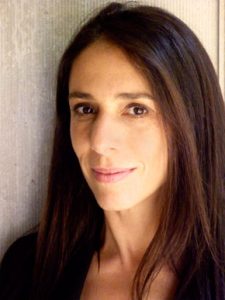 en“, that was reviewed here shortly after it came out. On April 17, 2017, her op-ed entitled “When Is a Church Not a Church?” was published in the New York Times. Use the link to read her thoughtful comments.
en“, that was reviewed here shortly after it came out. On April 17, 2017, her op-ed entitled “When Is a Church Not a Church?” was published in the New York Times. Use the link to read her thoughtful comments.
 While the attempt to exclude repeal of the Johnson Amendment, which prevents churches and other 501(c)(3) charities from campaigning in elections, from the sweeping tax “reform” law was successful, there are numerous bills in the Senate that are attempting to do just that. Please help us to prevent this from happening by calling your Missouri Senators Claire McCaskill and Roy Blount, or Illinois Senators Dick Durbin and Tammy Duckworth. (202-224-3121 is the Congressional switchboard -ask for the Senator by name). You can also ask for a Representative’s office at the same number. See the AU blog on this issue!
While the attempt to exclude repeal of the Johnson Amendment, which prevents churches and other 501(c)(3) charities from campaigning in elections, from the sweeping tax “reform” law was successful, there are numerous bills in the Senate that are attempting to do just that. Please help us to prevent this from happening by calling your Missouri Senators Claire McCaskill and Roy Blount, or Illinois Senators Dick Durbin and Tammy Duckworth. (202-224-3121 is the Congressional switchboard -ask for the Senator by name). You can also ask for a Representative’s office at the same number. See the AU blog on this issue!